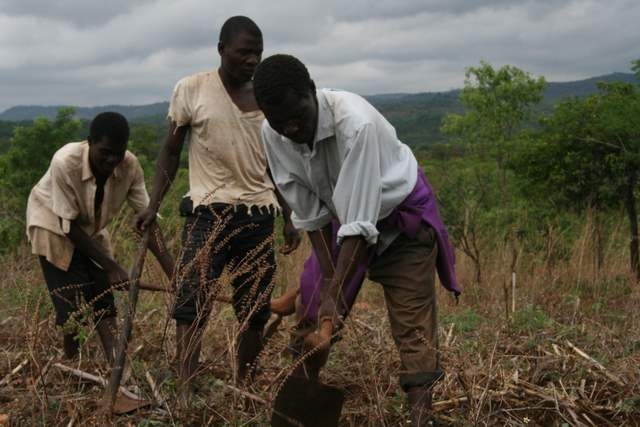Social Protection for Ultra-Poor People in Malawi
Objectives
The goal of this programme is to strengthen the system for implementing the Malawi National Social Support Programme (MNSSP) II, which contributes to ending extreme poverty in Malawi. The programme's full name is ‘Joint Support to the Implementation of Social Protection for Ultra-Poor People in Malawi’.
The MNSSP II (2018-2023) builds on the five sub-programmes of the first social support programme (2012-2016): social cash transfers, public works, school meals, savings and loan groups and microfinance. The MNSSP II’s priority areas are to:
1. support the consumption needs of poor households through timely, adequate and predictable cash and/or in-kind transfers
2. promote resilient livelihoods and set households on pathways to graduate out of poverty
3. develop a shock-sensitive social protection system that meets seasonal needs and prepares for and responds to unpredictable shocks.
To achieve these goals, the Government of Malawi recognises the need to apply a systemic approach and strengthen the social protection sector as a whole. The project supports Malawi’s Ministry of Economic Planning and Development and Public Sector Reforms to implement the MNSSP II at both national and district levels.

Activities
Activities include supporting the Government of Malawi to:
- form harmonised District Social Support Committees: these look at the different forms of social protection offered to households, and enable districts to jointly plan, monitor and implement social protection programmes across departments
- build the capacities of district officers and extension workers in social protection
- improve management of the MNSSP II at district level through the development and roll-out of a Programme Implementation Manual
- improve data management for the MNSSP II, in particular by developing and expanding the use of the Unified Beneficiary Registry, which is the single source of data for all social protection programmes in the country
- develop and roll out a harmonised e-payment mechanism that can be used by various cash transfer programmes
- develop and deliver a fair, transparent and harmonised grievance and redress mechanism, for the use of all MNSSP II programmes
- link social protection to resilience measures, e.g. by linking cash transfer beneficiaries to complementary interventions and supporting the government in the implementation of a watershed management-focused public works programme which improves climate resilience at community level.
More details about the project’s work are on GIZ’s website. The project is commissioned by the German Federal Ministry of Economic Cooperation and Development and co-funded by the UK’s Foreign and Commonwealth Development Office and the European Union.
Results
• In eight districts, District Social Support Committees meet regularly and their membership has been broadened to enable a more harmonised and coordinated approach to the implementation of social protection interventions.
• Jointly with the Ministry of Gender, Community Development and Social Welfare and Magomero Community College, the project developed an Integrated Social Protection Certificate Course. The course is the first of its kind in Malawi and is primarily targeted at training extension workers. The course equips extension workers not only with the theoretical background on social protection, but it also trains them on how to implement the MNSSP II programme specifically. The first cohort of 36 extension workers is expected to graduate in April 2021.
• The project is providing support, upon request, to district councils on various social protection issues. This has included, for instance:
• orientations on the Ministry of Gender, Community Development and Social Welfare’s Savings and Loan Groups Best Practice Guidelines
• orientations for district councils on the MNSSP II
• peer-to-peer and inter-district exchanges on the Unified Beneficiary Registry and e-payment mechanisms.
• A visit to Ghana allowed national and district level government officers to learn more about social protection issues there and it enhanced regional learning. The visit allowed stakeholders to draw practical lessons on the further design, implementation and coordination of a harmonised grievance and redress mechanism in Malawi (i.e. a mechanism that can be utilised by all social protection programmes). One key lesson learned was the utility of developing a tollfree helpline as a single channel for the public to report grievances. This feature will be developed as part of the MNSSP II grievance and redress mechanism.
• The project is supporting the government in the implementation of a public works programme, which focuses on and pilots integrated watershed management activities, to enhance beneficiaries’ resilience. Village level action plans were developed, and extension workers and communities sensitised on watershed management approaches. A public works management information system as well as a live monitoring tool was rolled out to all 10 pilot districts to enhance digital project management and enable tracking of individual work outputs, instead of hours worked. In addition, so far more than 2,000 EPWP beneficiaries were linked to complementary livelihood interventions.
• In 2019 and 2020, the Unified Beneficiary Registry was rolled out to a further eight districts in Malawi which means a total of 18 districts and data for more than 1.4 million households is available in the single beneficiary registry. Country-wide coverage of the UBR is expected by the end of 2021.
• Jointly with UNICEF, the project developed a national e-payment solution model. At the same time a harmonised e-payment mechanism, utilising the same service provider for social cash transfer and public works beneficiaries, is currently being applied as a pilot in one district.
Contact
Dr Petra Wagner, Team Leader:petra.wagner@giz.de
